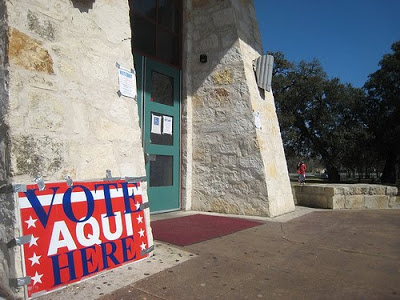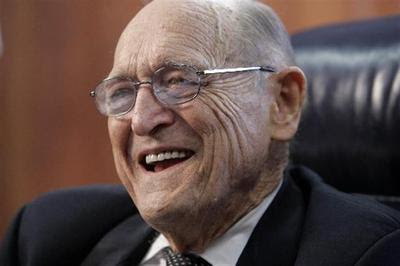Judge Justice and single member districts:
Bringing voting power to all Texans
By George Korbel / The Rag Blog / October 27, 2009
[Judge William Wayne Justice was a Texas federal district judge who died at age 89 on Oct. 13, 2009, in Austin. His rulings on landmark class-action suits led to school integration in Texas, as well as sweeping prison reform, the education of undocumented immigrants and much more. David Richards wrote of his legacy in The Rag Blog. Attorney George Korbel now provides a lawyerly take on Judge Justice’s profound effect on voting rights in Texas.]
I came to Texas in late 1971. Since that time I have usually represented Hispanic plaintiffs. Oscar Mauzy had driven up to Tyler to file the case attacking the 1971 House and State Senate redistricting. He then turned it over to David Richards. There was a concerted effort to remove Wayne Justice as the organizing judge. He hung tough and ended up on the panel.
His opinion in Graves v. Barnes affirmed as White v Regester was the first case in which the Supreme Court affirmed a finding of discrimination as a result of at-large elections. Four year later the findings in Graves/White formed the basis for the extension of the special provisions of the Federal Voting Rights Act to Texas. The Judge chronicled the decades of discrimination against Hispanics and litigation to redress it. And he explained how it all impacted the electoral process.
The litigation flowing from the Supreme Court affirmance of his Graves opinion sped up change in Texas. In 1971, all Texas cities and school districts elected their boards of trustees and councils at large which resulted in minimal Hispanic and virtually no African American representation. By the end of the decade, San Antonio, Houston, Dallas, Waco and a host of other cities and school districts were forced into single member districts as a result of Graves/White and the Federal Voting Rights Act.
Now virtually all of the urban areas in Texas, along with the rest of the South with the exception of Austin, elect by single member districts. Every person from every one of these jurisdictions has example after example of what changes were caused by geographic representation.
In San Antonio, every time it rained there were floods. Property was destroyed and people inevitably drowned. Virtually the first effort of the single member district city council was drainage and we have no floods now. The mother of the current mayor of San Antonio was one of the plaintiffs in the single member litigation. Such a simple concept as fair elections not only improved social and economic conditions but provided countless role models for the minority, the poor and the dispirited.
In a suit filed by David Richards, the judge issued first injunction enforcing Section 5 of the Voting Rights Act. Texas was going to purge all of the registered voters and start over from scratch in 1975. This would have been a major setback to minority voting. Fully eight million stamped sealed letters to all of our registered voters were stopped at the last moment.
Judge Justice’s impact on the expanded governmental use of the Spanish Language was likewise significant if less appreciated. His US v. Texas was a grand desegregation suit involving the entire state. An offshoot of that case was his opinion in the Del Rio school case tried by Warren Burnett in the early 1970s circa Graves/White. Judge Justice not only desegregated the schools but ordered bilingual education. Within a few years in one form or another it was common, controversial but common.
The decision in the Del Rio school case together with the Graves findings relating to problems of non-English speaking voters formed a significant part of the legislative history which resulted in the language provisions of the 1975 Voting Rights Act. Literally overnight, all election documents had to be translated into Spanish. People were allowed to vote in a language that only years earlier they had been punished for speaking in school. The success of elections in turn eventually led to the translation of virtually all forms that people have to fill out to obtain benefits from the state.
So many children have benefited from learning in Spanish. So many elections have been won and the benefits of government shared as a result. Though I was not all that close to him, some years ago I had a long chat with him at a reception in his honor in Del Rio where he often sat after moving to Austin. The questions he asked showed how interested he was in the language issues and the types of changes that had come about from single member districts. I ticked off a laundry list of the changes that I had seen. Finally I told him, “Judge, you started all of that.”
[George Korbel is a prominent attorney who specializes in voting rights issues. His offices are in San Antonio.]
Also see David Richards : The Judge Who Brought Justice to Texas by David Richards / The Rag Blog / October 22, 2009




















Justice Justice’s passing received a good deal of press in Texas, but not I suspect nationwide. May this article help to share his legacy further afield.
Here is the real story of the Del Rio litigation.
Burnett dropped out of the law suit, telling me that I was now the chief law because the Chicanos deserved one of their own, and the big Gringo lawyer had not particularly well served their interest. I called him a chicken shit and he cut me a huge wink, said “don’t be bashful, you can handle it, but keep me on the paper” and wished us all luck. It was clear that there would be more hearings and the judge wanted us there as amici, or friends of the court to protect the interests of the San Felipe Chicanos.
There were several more hearings, and at the last on August 13, 1971, Judge Justice entered his final order. we appealed, and when the case was remanded on Nov. 3, 1971, Dr.Jose Cardenas, former superintendent of the Edgewood School District in San Antono and a Chicano icon, offered to help us with the plan for education that the judge wanted in the case. Several times i tried reaching him but was never able to, so i assumed – wrongly, as it turned out, that it wasn’t because he did not want a lawyer helping with a plan for education. A hearing had been set for the Friday before Thanksgiving week, i think it was, and that is when i had an ugly lesson in loyalty. In open court, Dr. Cardenas announced that he had been retained by the Office of Education of the feds, and that he had a plan ready for the court’s consideration. I remember the Del Rio lawyers sitting there, smiling smugly.
It was a bombshell. We were without an expert, present at a hearing with no plan. In very few words I explained to the court what had happened, Cardenas was questioned, and he answered that he had assumed that the Del Rio lawyers had notified us of the situation. The court reset the hearing for the Friday following Thanksgiving andd asked us to file our plan by Wednesday. I flew back to El Paso with a copy of Cardenas’ plan. In preparation for the big hearing on the 26th of November, I burned midnight oil and then some, talked to some teacher friends, read a couple of books on bilingual-bicultural education, the importance of the family structure and how often parents did not participate in meetings with school officials, either because of inferiority feelings, lack of language skills, and the whole nine yards. My significant other and I took turns typing the thing. We took from the books, took from Cardenas’ plan, and invented more than a little bit
I faxed the thing to lawyer Kugle, who did us the favor of checking it and rearranging a couple of sections to make them more coherent. The hearing on Friday went extraordinarily well. In a cross-examination that took the greater part of the day, Dr. Cardenas agreed in open court that sentence by sentence, paragraph by paragraph and page by page, our plan was the bettter one. At first, he sparred with me, but my mentor Burnett had well taught me. What question were you answering? Let me make it easier for you. Please, Doctor, the court’s time is valuable. And so on.
I don’t overlook the fact that he may have had an attack of conscience. At the end, and just after I had gotten off the phone telling Burnett the good news, Richard Mithoff, Judge Justice’s clerk, told me that the Judge wanted me to assist in making sure that the plan would be corectly referenced in the order. I went to Mr. Mithoff’s office, stayed a bit, and told him that I was more than positive that the order would be well, in order.
Thank you for letting me set the record straight. the case can be found at 342 F.Supp 24 et seq., 1971.